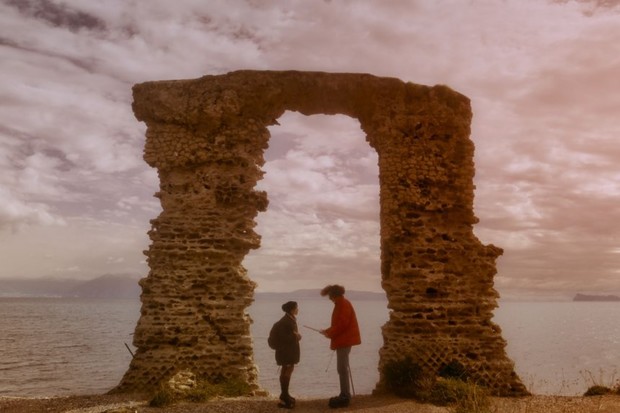Recensione: Mimì – Il principe delle tenebre
- L'esordio alla regia di Brando De Sica è una storia d'amore estrema tra adolescenti disadattati ambientata a Napoli

Questo articolo è disponibile in inglese.
The Locarno Film Festival has showcased Brando De Sica's feature debut, Mimì – Prince of Darkness, in its Out of Competition section, which focuses on midnight fare and other avant-garde dimensions of cinema. A University of Southern California graduate, De Sica has amassed a considerable amount of experience in technical roles, notably on projects with his father, Christian De Sica, after directing adverts and enjoying a brief stint as an actor. De Sica, as a co-writer of the script alongside Irene Pollini Giolai and Ugo Chiti, has crafted a contemporary gothic coming-of-age narrative that the director labels as “a ballad of dreamers”.
The narrative centres on Mimì (Domenico Cuomo), a young orphan taken under the wing of a pizza-restaurant owner, Nando (Mimmo Borrelli), who raises him and imparts the art of pizza-making. Due to a malformed foot, the protagonist is not only shy and socially withdrawn, but also becomes a target of harassment by the local mafia boss's son and his cronies. An unexpected meeting with goth girl Carmella (Sara Ciocca) prompts Mimì to venture outside the confines of the pizza restaurant, primarily because Carmella views him as an individual, rather than a "freak". The film could thus be described as a melodramatic teen coming-of-age flick that has a misfit setup with social repercussions.
Mimì – Prince of Darkness commences as a nod to tales like Edward Scissorhands and The Elephant Man, with a naive and bullied protagonist discovering acceptance within a vampiric youth subculture. The blossoming romance between Mimì and Carmella, a child runaway mocked as a kind of Corpse Bride, pulls Mimì out of his cloistered existence and comfort zone. Though the film fits within the young-adult category, De Sica employs expressive language and imagery that might unsettle certain viewers. Having said that, the graphic content – highlighted by a festival disclaimer that some scenes could shock viewers’ sensitivity – might draw in a niche audience of slasher aficionados with a penchant for vampire themes. In essence, De Sica’s movie flits between the loveable gothic tales of Tim Burton, grim fairy tales akin to Matteo Garrone's Pinocchio [+leggi anche:
recensione
trailer
intervista: Matteo Garrone
scheda film] adaptation, and the exaggerated skull shattering and gushing blood of a Grand Guignol for teens, positioning Mimì – Prince of Darkness as a neon-lit and overstylised cross-over between Let the Right One In [+leggi anche:
recensione
trailer
intervista: John Nordling
intervista: Tomas Alfredson
scheda film] and Edward Scissorhands, all unfolding in Naples.
The cinematography, clearly influenced by horror, showcases De Sica's oscillation between homage and pastiche, frequently making it hard to distinguish one from the other. He makes good use of vampire genre conventions, including cemeteries, crypts and tombs, while interspersing them with meta-cinematic allusions and nods to monster flicks within the teen-melodrama universe. Despite the stark violence and explicit dialogue, the relationship between the two main characters remains chaste and innocent. Through this juxtaposition that fuels hyperbole, De Sica makes a statement on the challenges that today's youth has to contend with in a corrupt, violent and ruthless world. The film's technical prowess is evident, blending comic-like stylisation with the aesthetics of music videos, elevated by Andrea Arnone's crisp cinematography.
Mimì – Prince of Darkness thus rebadges horror for teens, underscoring the importance of embracing diversity and suggesting that youth cinema is evolving to mirror the perspectives of the younger generations, who are encountering extreme and explicit content at an earlier age. While some might argue that the movie employs a form that is extreme for the story’s basically idealistic and romanticised substance, De Sica conveys the contrast with a tongue-in-cheek delivery.
Mimì – Prince of Darkness is an Italian production staged by Indiana Production SpA, Bartleby Film and RAI Cinema, with international sales managed by RAI Com.
(Tradotto dall'inglese)
Ti è piaciuto questo articolo? Iscriviti alla nostra newsletter per ricevere altri articoli direttamente nella tua casella di posta.

















